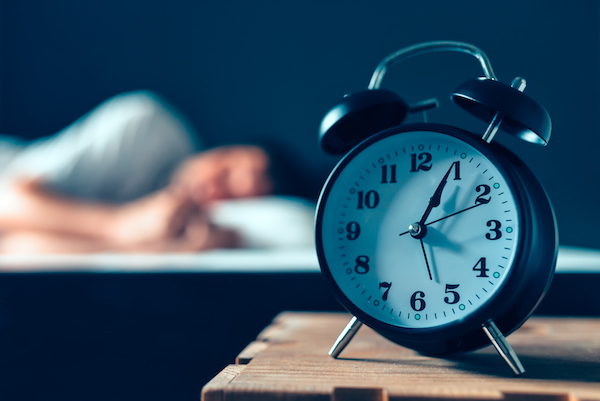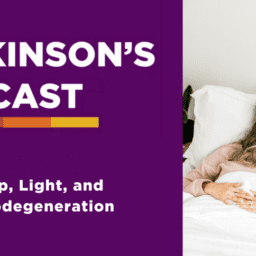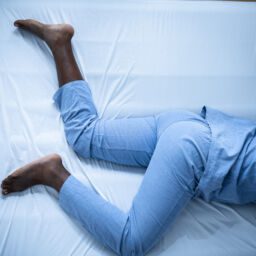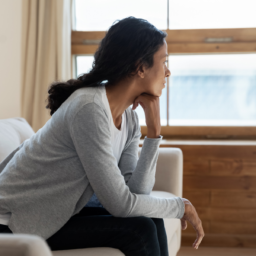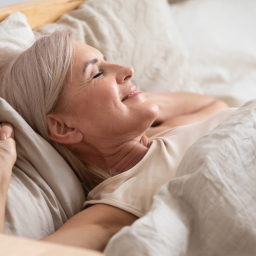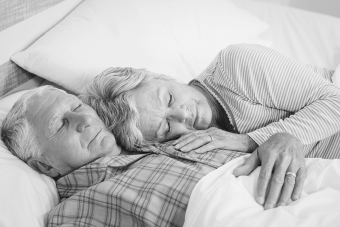 Parkinson’s can impact sleep in a number of ways, ranging from trouble falling or staying asleep at night to excessive sleepiness during the day. A good sleep boosts everything from your mood to your ability to think and process to your physical movement. Understanding sleep problems and Parkinson’s is often the first step you can take to enhance your sleep.
Parkinson’s can impact sleep in a number of ways, ranging from trouble falling or staying asleep at night to excessive sleepiness during the day. A good sleep boosts everything from your mood to your ability to think and process to your physical movement. Understanding sleep problems and Parkinson’s is often the first step you can take to enhance your sleep.
In this post, we help you learn more about sleep problems in Parkinson’s and how you can improve your quality of sleep.
Parkinson’s can affect sleep in many different ways, including trouble falling or staying asleep, vivid dreams, waking up frequently during the night and excessive sleepiness during the day. Like other non-motor symptoms, sleep problems can appear before the more recognized motor symptoms, like tremor or stiffness.
People with Parkinson’s typically experience some combination of insomnia (trouble falling asleep) and sleep fragmentation (waking up frequently during the night). Studies have shown people with Parkinson’s have different sleep patterns and that their deepest periods of sleep during the night are shorter and interrupted more often than people without Parkinson’s. Often this is made worse by medications that may wear off during the night, causing painful stiffness, difficulty moving in bed or other symptoms to return and disrupt sleep.
Other Sleep-Related Symptoms
Anxiety, depression, nighttime sweating and trouble moving in bed are other Parkinson’s symptoms that can make getting a good sleep difficult. Already disrupted sleep can also be exacerbated by how often some people with Parkinson’s find themselves waking up during the night to use the toilet because of bladder changes Parkinson’s may bring.
Occasionally medications used for Parkinson’s, including dopaminergic medications like carbidopa-levodopa (Sinemet®) and select antidepressants and sleep aids, can cause vivid dreams or nightmares that disrupt sleep. As unsettling as these can be alone, this can present serious concerns when combined with another possible effect of Parkinson’s on sleep called REM Sleep Behavior Disorder (RBD), when the natural processes that prevent you from physically acting out your dreams stop working. As a result, a person with RBD may yell, scream, kick or get out of bed as they act out their dreams.
Other non-Parkinson’s-related issues such as sleep apnea, pauses in breathing or shallow breathing during sleep, can make sleep problems worse. While sleep apnea is not more common in people living with Parkinson’s, it does occur more frequently in adults as they age.
Many people with Parkinson’s also experience excessive daytime sleepiness, which can be caused by the various effects of Parkinson’s that interrupt sleep at night as well as from side effects of some Parkinson’s medications, such as dopamine agonists like Mirapex (the brand name for Pramipexole) and Requip (the brand name for Ropinirole).
Restless Legs Syndrome (RLS)
Restless legs syndrome (RLS) is common in people with Parkinson’s and can present another interruption to a good night’s sleep. RLS is characterized by unpleasant feelings in the legs when they are at rest that is usually relieved with movement. RLS can result from medications and medical conditions other than Parkinson’s, so discuss with your doctor if you are experiencing RLS.
Difficulties with sleep can be caused by a number of factors. Some are directly related to Parkinson’s and its treatments, while others are completely unrelated. While many common issues can be improved with minor medication changes or other tweaks, it is important to understand the causes of common sleep issues associated with Parkinson’s and to discuss with your neurologist and other members of your care team to get the best sleep you possibly can.
MEDICATIONS
Medications play a critical role in living well with Parkinson’s for many people. However, there is an extended period of time each night when no medication is being taken, which can cause symptoms like muscle stiffness to return and wake you up. Often the first technique in addressing sleep problems is to optimize the timing of your medications to better account for wearing off in the night.
Begin by having a conversation with your doctor to see if optimizing medications you currently take could lead to improved sleep at night. In addition, some Parkinson’s-related medications can induce sleep. See if it may be possible to take those later in the day to both benefit from the effects of the medications while also improving the quality of your sleep.
There may also be some medications directly interfering with your sleep quality, which is another important topic to discuss with your doctor so you can find the best approach to optimizing your medications and improve the quality of your sleep.
PAIN
Pain is a common yet often misunderstood or misrecognized symptom associated with Parkinson’s. Pain can be caused by muscle cramping (known as dystonia) or stiffness associated with Parkinson’s. Discussing how to optimize your medications can help address pain preventing you from sleeping well. Pain caused by aging or old injuries can often be addressed by working with a physical therapist.
If your pain is not controlled by managing medication timing and/or physical therapy, pain medications may be effective and help improve sleep at the same time. However, many pain medications carry additional side effects that could increase your risk of falling (especially at night), as well as have effects that carry into the morning, such as fatigue and problems with balance. In addition, certain pain medications are associated with increased constipation.
Consider all of these factors as you have a conversation with your doctor about approaches to dealing with pain.
ANXIETY, DEPRESSION AND OTHER PSYCHOLOGICAL ISSUES
Anxiety, depression, apathy and other psychological symptoms of Parkinson’s can significantly impact your quality of sleep. Have a conversation with your doctor if you are experiencing these or other psychological effects of Parkinson’s. Improving these symptoms will not only enhance your overall quality of life, but it may also help you sleep better too. In addition, some medications for these types of issues can cause drowsiness which may improve sleep quality, particularly if taken at night.
NIGHTTIME TRIPS TO THE BATHROOM (NOCTURIA)
Waking up frequently during the night to use the toilet is called nocturia and is common among people with Parkinson’s. These interruptions in the sleep cycle can have a significant impact on your overall quality of sleep.
If you find yourself getting up more than once during the night to use the toilet, discuss with your doctor to see if there are certain medications that might be helpful. Sometimes this can be corrected by working with an “incontinence specialist” (typically this a physical or occupational therapist with specialized training). Limiting the amount of liquid you drink a couple of hours before bed may help with nocturia as well.
CAUSES NOT RELATED TO PARKINSON’S
There are a number of other causes of sleep problems that are not related to Parkinson’s, such as pain not connected to Parkinson’s or sleep apnea. People with sleep apnea experience frequent interruptions in their breathing as they sleep, which can further fragment sleep and cause low levels of oxygen in the blood.
Finally, simply failing to prepare the bedroom for rest by minimizing outside light and activities as well as reducing noise can have a major impact on sleep quality. Exercising too late in the afternoon or evening can sometimes make it difficult to fall asleep. Similarly, drinking too many liquids, especially alcohol or caffeine, can interfere with sleep at night.
SLEEP MEDICATIONS
There are several sleep aids available both over-the-counter and by prescription. It is important to have an ongoing conversation about these medications with your doctor, as many of these medications can have undesirable side effects, particularly for people living with Parkinson’s. Some of these medications may also increase your risk of developing Alzheimer’s or other types of dementia.
OVER-THE-COUNTER ANTIHISTAMINES
This type of medication works in large part by reducing the amount of the neurotransmitter acetylcholine in the system. Acetylcholine is associated with alertness and attention. While reducing it can lead to sleepiness, it can also cause secondary side effects such as dry mouth and cognitive impairment. A common anticholinergic in many over-the-counter sleep aids is diphenhydramine (better known as Benadryl®).
OLDER SLEEP MEDICATIONS
This class of medications are among the most commonly prescribed for sleep disorders and include diazepam, lorazepam, clonazepam and alprazolam, a class of drugs called benzodiazepines that includes Valium® and Xanax®.
However, they are associated with symptoms of physical dependence and although the research is not conclusive, there is a possible link between these sleep medications and an increased risk of dementia.
NEWER SLEEP MEDICATIONS
Newer sleep medications include Ambien® (zolpidem), Lunesta® (eszopiclone) and Sonata® (zaleplon). Although they act upon the same neurotransmitters as older sleep medications, they do not bring the same type of side effects and are generally considered safer.
However, there have been reports of some unusual behaviors while on these medications, such as sleepwalking. There are also some indications that discontinuing using these sleep medications may increase insomnia-like symptoms, called rebound insomnia.
Before taking any herbal supplements or other approaches to addressing your sleep difficulties, be sure to discuss with your doctor to see if there are any possible complications with your existing medications or whether your sleep challenges are caused by another problem related to Parkinson’s that will not be helped by a sleep aid.
MELATONIN
Melatonin is available as an over-the-counter supplement and may provide some short-term benefits. Melatonin helps regulate your circadian rhythms or body clock. Melatonin does not have any particular sleep-inducing qualities, rather it supplements the natural neurotransmitters associated with sleep.
Although melatonin is not considered a controlled substance and is not associated with any kind of dependence, it may not be effective for everyone and effects may be short-lived. It may also be associated with some residual sleepiness and fatigue the following day.
VALERIAN ROOT AND OTHER HERBAL SUPPLEMENTS
A quick tour in the supplement aisle at a grocery store can give you a dizzying array of herbal supplements advertised to improve sleep. Valerian root is one of the most widely recognized. Although it has the potential for significantly enhancing sleep, people often experience residual sleepiness the next day.
Typically, you will find products combining several different compounds. The ability of these different compounds to induce sleep has not necessarily been studied, particularly in people living with Parkinson’s. If you’re interested in trying one of these products, consult your doctor with a list of the ingredients before attempting to incorporate them into your sleep routine.
ALCOHOL
While alcohol may initially make you feel drowsy, numerous studies have shown individuals who drink alcohol before bedtime tend to wake up more often and have a less restful sleep. In addition, alcohol may interact with certain medications, enhancing or inhibiting their effects in a potentially dangerous way.
MEDICAL MARIJUANA
Marijuana continues to be studied for its effects on people living with Parkinson’s. While results are not conclusive, sleep induced under the effects of marijuana may not be as restful and can have residual effects in the morning, such as taking longer to feel awake.
It’s possible that medical marijuana might provide some level of pain relief which could enhance sleep function. However, there are other potential side effects, including changes in your balance and ability to think and process that could present problems in the night, such as impeding your balance if you get up in the night to use the toilet.
There are a number of steps you can take right now that may improve your quality of sleep. These approaches are known as sleep hygiene practices and habits that help you sleep well on a regular basis.
Here are some sleep hygiene tips:
- Be mindful of what you eat for dinner. High-protein foods may interfere with the absorption of medications for Parkinson’s (particularly carbidopa/levodopa or Sinemet®). This may make the medication wear off prematurely, causing symptoms to return in the night.
- High-protein foods, particularly meat and dairy, also take longer to digest. This could lead to reflux and other issues that could interfere with sleep.
- Reduce liquids a couple of hours before bed to try to reduce the number of times you need to get up in the night to use the toilet.
- Although regular exercise is associated with better sleep quality, it’s important to avoid strenuous activity too late in the evening as it may increase alertness and interfere with sleep.
- Avoid sources of “blue light.”
- Computers, tablets, smartphones and televisions emit light in the same spectrum associated with daylight (so-called “blue light”). Spending time with these “blue-light sources” in the evening can sometimes “fool” your sensory system, tricking the brain into thinking that it is daytime and making it harder to fall asleep.
- Watching stimulating or exciting content such as a movie or television program can also interfere with sleep. It’s a good idea to avoid watching high-energy content in the hour or two before going to bed. This will also reduce your exposure to blue-light sources.
EXERCISE
Regular vigorous exercise can help with many aspects of Parkinson’s and sleep is no exception. However, try to avoid high-intensity exercise later in the day if you can. Instead, consider simple stretching, walks, yoga or Pilates in the evenings.
I wake up 3-5 times a night, except after vigorous exercise. I always sleep better if I’ve done a long walk or something like that during the day. – Paul
Interestingly, although exercise is associated with better quality of sleep, it may take a bit of time for you to experience real benefits in your own sleep cycle. A study at Northwestern University showed that people with disturbed sleep patterns took up to four months to see improvements in their sleep as a result of exercise.
REM sleep behavior disorder (RBD) is a non-motor and sleep-specific disorder associated with Parkinson’s. Typically, the body shuts off muscle activity during REM sleep. With RBD, muscle activity and dream enactment occur during REM sleep.
A person with RBD acts out vivid dreams in different ways that may range from talking to jumping from bed to kicking a sleep partner. Bed partners report violent responses by the person with RBD, involving being punched, bitten or kicked, while the person acting out the dream is unaware of this behavior.
People with RBD report experiencing vivid dreams and that the disorder gets in the way of having a restful night of sleep. The frequency of RBD can range from one night per month to several times per night. While RBD can occur on its own, between one-third and one-half of people with Parkinson’s report RBD as a symptom.
Living Well with REM Sleep Behavior Disorder – We provide important research, tips and information to help you and your partner manage RBD.
Watch: Sleep Issues in Parkinson’s with Dr. Anne-Louise Lafontaine, movement disorder specialist and director of the McGill University Movement Disorders Clinic in Quebec
Insomnia and Sleep Worksheet Learn more about changes you can make to your diet, lifestyle and bedroom to help improve your quality of sleep.
What is REM Sleep Behavior Disorder? Research, tips and information to help you and your partner manage RBD.
Living Well with REM Sleep Behavior Disorder. Read about Kelsey Phinney’s experience and listen to her podcast investigating how to live well with RBD.
Beware the Blue Monster: Light Can Change How You Sleep. Scientists are learning that the light coming from the screens of these devices may impact our ability to sleep.
Tips for When You’re Awake in the Night. Before you spend the next hours anxiously awake, follow our helpful advice so you can drift back into dreamland.
Making the Best of a Bad Night’s Sleep. If you didn’t sleep last night, consider the following steps to make the next day a little easier.


